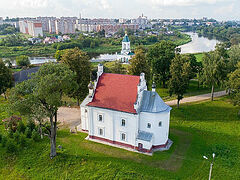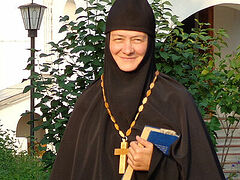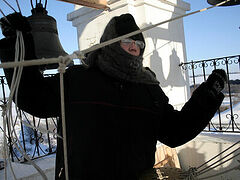In Part 1 of this article, we spoke about the history of the Siberian village of Kolivan and the Holy Protection-St. Alexander Nevsky Monastery that was built there in the early 1990s. In this second part, we spoke with the current abbess of the monastery, Igumena Maria (Gurvich), appointed to the post on May 16, 2023.
“I realized I was finally home”
—Mother Maria, Abbess Nadezhda remains in the monastery as the abbess emeritus. This situation is rare, if not unique, first of all because there is a living continuity here. You’ve also been at the monastery almost from the time it was opened, haven’t you?
—I came to Kolivan for obedience in the fall of 1993.
—It could be said that the management of the monastery was transferred “by inheritance.” This is a wonderful example of the spiritual life.
—Our Mother is an extraordinary person; she has amazing gifts from God, which she hides, but the Lord shows them anyways. If you listen to Mother’s advice, everything will always go well. If you want to do your own will, you’ll definitely stumble on something…
We really feel her love. She has no condemnation; she wants all the sisters that have gathered here to be saved. After all, Mother was brought up by the great venerable elders of the Glinsk Hermitage—Zinovy (Mazhuga), Seraphim (Romantsov), Andronik (Lukash), and her spiritual father was Schema-Archimandrite Vitaly (Sidorenko). When, beginning in the 1950s, the Glinsk Elders were received by Orthodox Georgia, Mother Nadezhda often went there for spiritual guidance and support.
—Mother, how did you come to realize that you wanted to go to a monastery?
—At the very start of the 1990s, I, a Muscovite, went to England to study working with people with mental disabilities—there it’s called “learning difficulties.” I went with thoughts of organizing such assistance in Russia in the future. In London, I went to the Church of the Dormition of the Most Holy Theotokos, to Vladyka Anthony of Sourozh, and I got to know the parishioners. One of them told me about the Orthodox monastery in Essex and suggested that I go there. When I managed to go to the monastery, I realized I was finally home—not in a territorial sense, but in a deep sense. The monastery is home, and I was finally home. Soon, Schema-Archimandrite Simeon1 blessed me for monasticism, in Russia in particular. Then it happened that for some time neither she nor the other fathers in the monastery answered my questions about where I should go. I didn’t know any monasteries at home—they were just beginning to revive. I received the answer, also not immediately, from the Elder himself, Schema-Archimandrite Sophrony (Sakharov). They brought me a photo of the Kolivan church, saying: “Here, the Elder has blessed you to go there.” Where the Elder got this photo from, how it all happened in general can be explained by nothing other than the providence of God and the mercy of the Queen of Heaven.
—What were your obediences upon your arrival at Kolivan?
—Fr. Simeon told me: “Your first obedience will be in the barnyard;” and when I arrived, that’s what Mother gave me. It was a wonderful obedience and I liked it. In the world it was hard to divide yourself into work and home—there was some kind of dissonance. But the monastery didn’t have this division, and whether your obedience is difficult or not—you don’t think about it, you don’t even consider it from this point of view. At the same time, Mother started giving me other obediences as well. We started gathering a library as the monastery was getting established; many books were donated to us. I have a degree in library science, and after the barnyard I would go catalog the books.
Then Mother gave me the obedience of responding to letters. I really didn’t like this kind of work, starting with essays in school. I didn’t like math either; but Mother nevertheless appointed me as the treasurer. I also had to start working on the site, but now, thank God, I have some helpers for all these things.
—Do the sisters in the monastery do everything themselves?
—Yes, it’s been that way from the very beginning, when we had to unload building materials ourselves and carry bricks up on scaffolding. There was no money, and the menial work during the construction of the fence and the cell building fell on the sisters’ shoulders. After all, by 1992, only the church was restored, and that’s where the sisters slept at first.
We’ve mastered many things, even driving trucks and working on a tractor! We still have to devote considerable effort to things like that—construction and endless repairs. But not only that—we also had and have artistic obediences.
—Are you talking about how the sisters painted the church themselves?
—Yes, although there were no iconographers among us, only one sister who had graduated from an arts trade school as a muralist. She knew the peculiarities of large-scale images located up high. Then we got some discs with photos of the interiors of Serbian churches, before they were destroyed by NATO bombing. We saw how much ornamentation was used in their painting. And we decided to give it a try. There was work for everyone—painting on scaffolding and preparing cardboard stencils down below. And the elderly sisters sat and prayed continuously. We did this for several years. We mostly managed to paint from Nativity until the end of Great Lent, because our summer farm work didn’t stop—gardens, flower breeding, and haymaking. The obedience on the kliros, as well as sewing, embroidery, Sunday School teaching, and preparing exhibitions and reports for various dates and events can, it seems, be counted as artistic obediences.
—Do you have helpers for the farm work?
—Our spiritual father Igumen Vladimir (Sokolov) blessed his most long-standing parishioner to organize people to help us. Now people are coming from Novosibirsk on Saturdays to work with us at least a little bit. They’re our main helpers. In Kolivan itself, there are few such people, unfortunately.
—You said that Mother Nadezhda took you all through a one-year theological course (organized a long time ago, in the early 90s, at the Novosibirsk Metropolis), and you’ve continued this tradition. Did you joyfully receive this duty of teaching the sisters, or was it just an additional burden?
—Joyfully, especially considering that we had really good teachers for the Old and New Testaments last year: Archpriest Alexander Remorov and his Matushka Tatiana Ivanovna,2 who came to teach us at the monastery. Even those sisters who could be exempt from obligatory attendance due to their age come to study with us.
—And what guided you in your spiritual life? Who do you consider to be your teachers?
—For me it was Elder Sophrony (Sakharov) and Fr. Vitaly (Sidorenko). I was nourished by Elder Sophrony’s books and talks that he gave at his St. John the Baptist Monastery. I was able to bring tapes of his talks, and Mother permitted me to listen to them. Orthodox people are celebrating two jubilees this year: eighty-five years since the repose of St. Silouan the Athonite and thirty years since the repose of his disciple and co-struggler Schema-Archimandrite Sophrony (Sakharov).3
—Are you trying to pass this experience on to the sisters?
—The decree on my appointment as abbess was just issued in May of this year. But Mother had already entrusted me with spiritual children—novices and riassaphore nuns—a while ago. Now some of them have already been tonsured as stavrophore nuns.
We’re always reading something. At trapeza, we listen to teachings and homilies. We have talks with the sisters—maybe not as much as we’d like…
—What do you think, why are there fewer monastics today? How does the world hold people back today? What distinguishes the modern generation of monastics, and what would you wish for people who are striving for the monastic life now?
—Nowadays, the struggle for so-called “human freedom” has taken center stage and the renunciation of one’s will is seen by modern man as something very painful, so it’s hard to be in a monastery. To learn obedience is to learn the most important thing, because through obedience, God gives you everything: patience, humility, prayer, and love. But it’ll take time for you to get to know yourself, to find out what’s not in you and what passions torment you. It’s not in vain that St. Ambrose of Optina said: “Know yourself, and that will be enough for you.” And as for patience, the Elder would say, we need “not a cart, but a whole wagon load.” We also have to have mercy on each other…
It seems it’s very hard to talk about love in our times. It’s such an unattainable thing! But to treat each other with mercy—this is our duty. Only God gives love, and we have to learn mercy, to put up with each other, to pity each other. There’s nothing humiliating about pity—on the contrary. It’s a motherly feeling.
“The conditions of monasticism with its principle of obedience makes man capable of embracing everyone in his love.”4 Love is a gift from God. But if we really want to find it within ourselves, maybe the Lord will give it to us. But if we don’t strive for it, why should He give it to us?
—And how can we do this?
—Probably, remember God’s love, His mercy. In my opinion, to live without it in general is quite difficult, if you don’t remember Divine mercy. If you desire mercy, give it to others yourself. Whatever measure you use will be measured back to you.
Our task is to justify a person. We can’t judge, we don’t know his heart. We don’t know how someone else repents. He may have repented immediately after his wrongdoing, and we’ve condemned him. After all, the thief on the cross didn’t confess “according to the rules,” but simply confessed himself unworthy, sinful.
We’re quick to condemn: “This sister didn’t bow to me.” But maybe she has a headache… And the Lord has to show us this through our own health. Lately, it seems like it’s only by illnesses and sorrows that we can learn something.
I remember how Elder Sophrony told the sisters: “How can you be well when somewhere there’s war, floods, earthquakes…? We come from the same Adam. Even if we’re enclosed by walls, everything that happens in the world comes through.” As the years go by, this understanding becomes clearer. And the words: “Acquire the spirit of peace and thousands around you will be saved.” And if you get angry at someone, if you quarrel with someone, this spirit of malice, of grumbling will also spread to those around you.
It's very important to thank God. It seems to me this is one of the paths of our salvation. Give thanks for everything: Look at what weather, what clouds, what flowers, what beautiful churches, what icons there are… Even just for the fact that someone smiled at you—please, thank God. We have no humility, no patience, nothing… But at least be grateful! Thanksgiving drives away condemnation, grumbling, discontent. Remind yourself more often what gifts the Lord gives you.











